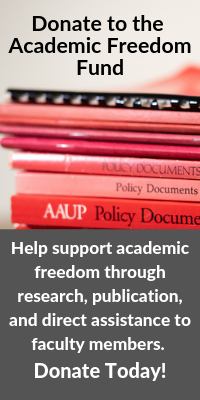- About
- Programs
- Resources
- For AFT Higher Ed Members
- Academic Freedom
- Shared Governance
- Political Interference in Higher Ed
- Racial Justice
- Diversity in Higher Ed
- Responding to Financial Crisis
- Privatization and OPMs
- COVID-19 Pandemic
- Contingent Faculty Positions
- Tenure
- Workplace Issues
- Gender and Sexuality in Higher Ed
- Targeted Harassment
- Intellectual Property & Copyright
- Free Speech on Campus
- Civility
- Publications
- Data
- News
- Membership
- Chapters
Call for Papers
The March 5, 2024, deadline for submissions has passed. Late submissions will only be accepted by prior arrangement with the staff editor or faculty coeditors. Please direct any questions to [email protected].
SUBMISSION GUIDELINES
EDITORIAL POLICY
Volume 15: Truth-Telling versus Propaganda—Exposing the Rift
 Our 2024 call for papers seeks submissions that build on the themes of the previous two volumes to collectively and iteratively advance understandings and analyses of the salience of academic freedom not only to higher education but also to democracy, social justice, international cooperation, and global problem-solving. Attacks on informed speech and academic freedom, discussed in the 2022 and 2023 volumes, also correspond to attacks on other forms of societal freedom and openness, such as the independence of the press and access to voting. Despite improvements in the protection and adjudication of academic freedom during the twentieth century, recent data, including assessments from the 2023 Academic Freedom Index, indicate a decline in academic freedom worldwide, affecting not just authoritarian regimes but also some liberal democracies like the United States.
Our 2024 call for papers seeks submissions that build on the themes of the previous two volumes to collectively and iteratively advance understandings and analyses of the salience of academic freedom not only to higher education but also to democracy, social justice, international cooperation, and global problem-solving. Attacks on informed speech and academic freedom, discussed in the 2022 and 2023 volumes, also correspond to attacks on other forms of societal freedom and openness, such as the independence of the press and access to voting. Despite improvements in the protection and adjudication of academic freedom during the twentieth century, recent data, including assessments from the 2023 Academic Freedom Index, indicate a decline in academic freedom worldwide, affecting not just authoritarian regimes but also some liberal democracies like the United States.
Compounded by the rise of illiberal movements, social media platforms, and the partisan ownership and control of mass media corporations, misinformation, disinformation, and propaganda increasingly mar public discourse. Artificial intelligence will bring more challenges to the arbiters and institutions that fortify informed speech in the public sphere. Higher education is at the center of these societal rifts between truth-telling and propaganda. As disinformation and misinformation are routinely deployed by authoritarian actors on subnational, national, and international stages, these propagandistic initiatives foment hostilities and destabilize public spheres in more open and inclusive societies while quelling inquiry and dissent in authoritarian spaces. Authoritarian attacks on democracy and public truth-telling run parallel to attacks on academic freedom.
New media technologies such as deepfakes deliver contemporary propaganda that masquerades as informed speech to manufacture, suppress, or deny factual, inclusive, and validated claims. The overwhelming presence of these technologies poses key questions to the critical methods and discourses of academic knowledge production. Who will train future generations to distinguish legitimate truth-telling from fake news, alternative facts, and the vast streams of misinformation and disinformation? Higher education is a clearinghouse for adjudicating truth claims, and academic freedom is the ethical commitment that ensures its integrity. From the peddling of conspiracy theories to the approval of far-right, nonacademic content for public school curricula, the rift is widening between propagandistic, faith-based assertions or partisan opinions and informed, well-reasoned, and externally vetted truth claims. Naming this rift, and identifying the propagandists who put power and ideology over sincerity and authenticity, is a necessary act in the history of truth-telling—and a defense against threats to democracy and a more free, open, and inclusive public sphere.
Although we invite any submission relevant to the journal’s core focus on academic freedom, we will give priority to articles that address any of the following topics:
- Academic freedom’s integral role in the disciplined work of scientific discovery, creative ingenuity, and the enduring quest for truth
- Academic freedom as a necessary framework for discerning propaganda
- Misinformation and propaganda that target higher education
- The AAUP’s mission and track record as an organization devoted to the preservation of integrity in modern academia
- Examinations of the international Academic Freedom Index to consider the global trajectories of authoritarian movements and aggregate declines in measures of academic freedom
- Parallels between assaults on academic freedom and assaults on freedom of the press, including those documented by the World Press Freedom Index
- Case studies or comparative discussions of international associations concerned with academic freedom, such as Scholars at Risk, whose Academic Freedom Monitoring Project could serve as a potential resource
- Donor impacts on academic freedom
- Issues of academic integrity in the face of financial disinvestment or disinformation and propaganda
- Current examples of debates over truth and propaganda amid the fog of war—for example, in Ukraine or the Middle East
- Attacks on gender and sexuality studies as attacks on academic freedom
- Artificial intelligence, academic freedom, and the long-lasting but evolving debate over forgery and truth
Download a one-page version of the call for papers.
SUBMISSION GUIDELINES
Electronic submissions of 2,000–5,000 words (including any notes and references) should be sent to [email protected] by March 5, 2024, and they must include an abstract of about 150 words and a short biographical note of one to two sentences about the author(s). Because of word-count limitations for the volume, shorter submissions might have a better chance of acceptance, and the editors may make acceptance of any article contingent on substantial edits or cuts.
Please read our editorial policy prior to submitting. We welcome submissions by any and all faculty, staff, graduate students, and independent scholars. Authors using pseudonyms must notify the journal at the time of submission, disclose their real names, and explain their reasons for wishing to keep their identities confidential. If you have any questions for the faculty editors about the call for papers or ideas for an article, you may contact Michael Dreiling and Pedro García-Caro, but be sure to send submissions to [email protected] rather than to their addresses.
While this is an academic journal with submissions subject to peer review (authors should indicate with their initial submissions if this is useful or important to them), we welcome innovative and journalistic prose styles. The journal uses the seventeenth edition of the Chicago Manual of Style and follows Chicago’s author-date system of citation. Authors should anticipate that, if an article is accepted for publication, it will need to be put into Chicago style. Read more about the Journal of Academic Freedom.



